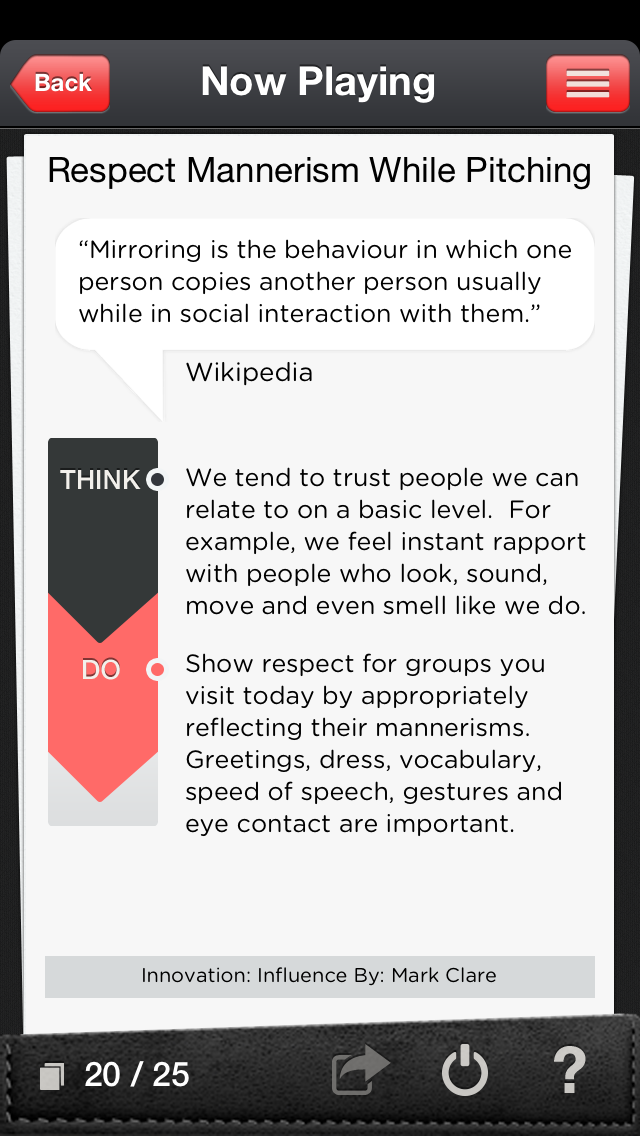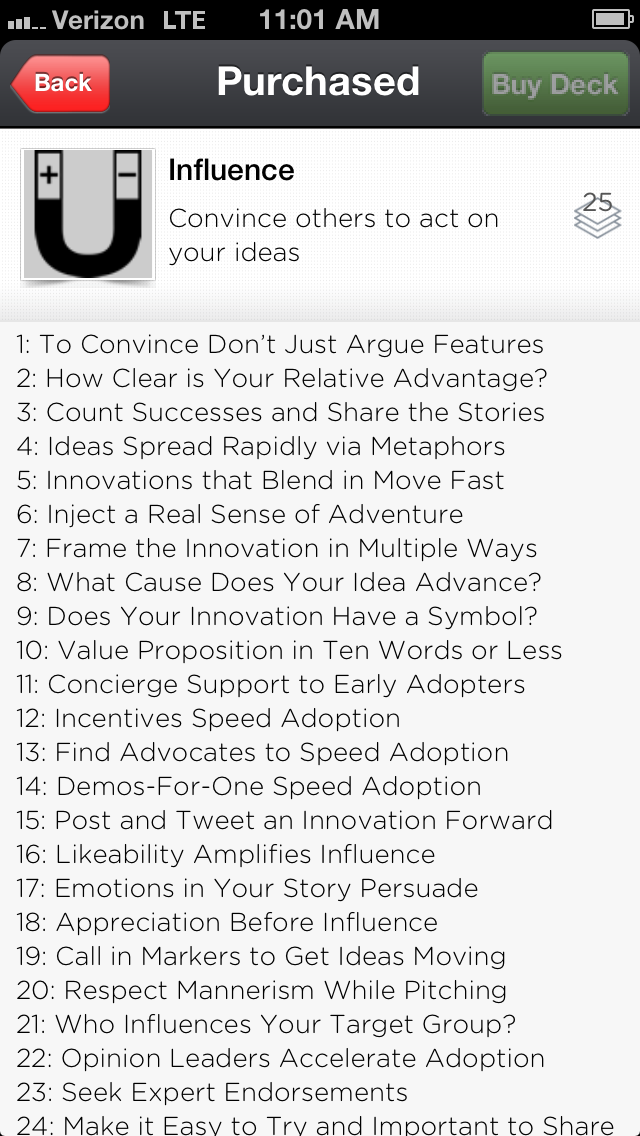Mental Performance Anxiety – Get Excited!
Most people experience performance anxiety. This includes all the feelings you have before and during a task you must do while others are watching and judging. How well we cope with these feelings often determines how well we do. Performance anxiety can be especially acute when the task we must perform involves thinking, learning, decision-making and other cognitive or mental performances. For example, knowing that you are going to have to “think on your feet” is often what worries people about public speaking.
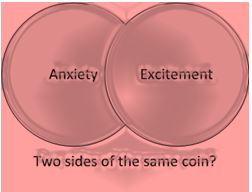 Learning to manage mental performance anxiety is critical for improving brain function and cognitive performance so it is a key topic on the Next Brain Blog. While we are often taught to try and calm ourselves down during bouts of performance anxiety, recent research indicates we may want to do just the opposite and jazz ourselves up. The idea is to reframe the energy associated with anxiety into a more productive state – excitement. As the researchers point out:
Learning to manage mental performance anxiety is critical for improving brain function and cognitive performance so it is a key topic on the Next Brain Blog. While we are often taught to try and calm ourselves down during bouts of performance anxiety, recent research indicates we may want to do just the opposite and jazz ourselves up. The idea is to reframe the energy associated with anxiety into a more productive state – excitement. As the researchers point out:
“Since both anxiety and excitement are emotional states characterized by high arousal, it may be easier to view anxiety as excitement rather than trying to calm down to combat performance anxiety…”
Start by using a simple affirmation – “I am excited” or “This is exciting because….”. Rather than resist feelings of anxiety step into the energy it offers by repeating simple but positive mental self-talk. It takes a bit of practice but it works.
I am very interested to hear from readers that have developed ways to get the most out of mental performance anxiety.
Categories: Mental Focus Tags:
A Placebo for Cognitive Enhancement?
In the Next Brain blog we report on research that suggests how we think about our own mental abilities has a significant impact on how well we perform. For example, in Perception of Age Impacts Cognitive Performance, we reported on a study that shows simply “thinking that you are old” will impact your score on a dementia test.
 Self-image, especially as it relates to what we believe we know, might be a powerful placebo for cognitive performance. More evidence comes from Your Thinking can Release Abilities Beyond Normal Limits, in The Scientific American. The article reviews an experiment that shows if you expect to know the answer to a question you tend to score better.
Self-image, especially as it relates to what we believe we know, might be a powerful placebo for cognitive performance. More evidence comes from Your Thinking can Release Abilities Beyond Normal Limits, in The Scientific American. The article reviews an experiment that shows if you expect to know the answer to a question you tend to score better.
Such results suggest (but by no means prove) that confidence, positive thinking, a growth mindset and affirmation could have a significant impact on memory, learning, creativity, visual acuity and a wide-range of cognitive performances.
This is a good news. It does not take too much effort to develop a positive affirmation about our mental abilities and then repeat it on a regular basis. For example, when struggling with a hard problem you could regularly repeat: “As I have in the past, I will see the answer to this problem”. You could even combine the affirmation with a ritual such as sitting in your creative chair or wearing your lucky shirt.
I am interested to hear from readers that have examples of placebos for cognitive performance.
Categories: Lifestyle, Mental Focus, Problem Solving Tags:
Can Blue Light Boost Your Mood and Alertness?
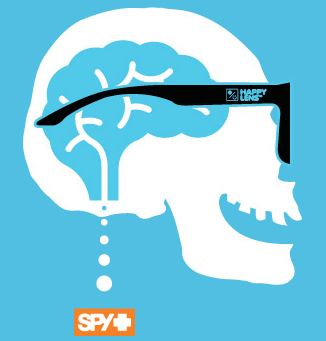 SPY has modified premium quality sunglasses to allow long-wave blue light to pass into your eyes in the hopes of creating a positive mood. The SPY Happy Lens Technology is designed to:
SPY has modified premium quality sunglasses to allow long-wave blue light to pass into your eyes in the hopes of creating a positive mood. The SPY Happy Lens Technology is designed to:
“harmonize” with the body’s physiological preference for a specific color transmission, optimized through the important wavelengths between 450 and 500 nanometers, where the “uplifting” effects of blue (“happy”) light are most prevalent.”
While there is some evidence that this can work the product is new to the market. Cost is in the $150-$200 range and glasses are available in a variety of styles and come with a guarantee.
Click on the image to watch a video on how they work.
Interested to hear from readers that wear happy glasses.
Categories: Mental Focus Tags:
Use Your Body to Boost Mental Performance
 Cognition is embodied. That is, how well you think and learn is in part controlled by how you use your body. We have covered many examples of how this works in the Next Brain Blog including stepping back for better emotional control, talking with your hands, thinking by walking around, posture effects (e.g. folding your arms) and short-duration physical activities interspersed with study.
Cognition is embodied. That is, how well you think and learn is in part controlled by how you use your body. We have covered many examples of how this works in the Next Brain Blog including stepping back for better emotional control, talking with your hands, thinking by walking around, posture effects (e.g. folding your arms) and short-duration physical activities interspersed with study.
See Use Your Body to Improve Thinking Instantly for more details.
Now the PsyBlog offers an excellent summary in 8 Easy Bodily Actions that Transform Mental Performance. These include for example, how using a deep voice can improve abstract thinking, a power stance can improve your sense of control, and just imaging yourself walking towards an important person or object can increase a sense of mastery.
Some of these are new to me and I am actively experimenting with them. Interested to hear from readers that have tried them out.
Categories: Lifestyle, Manage Emotions, Memory and Learning, Mental Focus, Problem Solving, Training Tags:
Innovators are Influencers
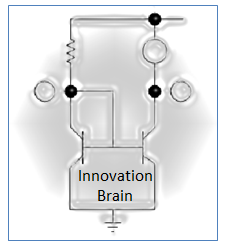 There is a lot of interest in getting better at innovation these days. While much of the focus is on creativity skill, a broader view indicates there are four areas you need to cultivate to build your innovation brain. These include:
There is a lot of interest in getting better at innovation these days. While much of the focus is on creativity skill, a broader view indicates there are four areas you need to cultivate to build your innovation brain. These include:
- Find or energize an innovation calling
- Reframe thinking to go in new directions
- Learn rapidly and deeply from experience
- Influence others to adopt new practices.
Surprisingly, the topic of influence seems to get the least attention. Innovators must convince others to invest time and resources in their raw ideas, persuade early adopters to try out prototypes and spend tremendous energy getting others to change behavior in order to grow a user base. Influence is a key to all phases of innovation.
There are many excellent books on how to get better at positive influence. Two of my favorites are the Influencer now in a second edition and How to Get People to Do Stuff. The Influencer advocates a focus on vital behaviors and provides a broad framework for crafting influence strategies. Get People to Do Stuff zeros in on the seven sources of motivation and provides very specific suggestions. For example:
“If you use nouns when making a request, rather than verbs – for example: “Be a donor” versus “Donate now” – it results in more people taking action. That’s because nouns invoke group identity.”
A careful read of both books reveals that they are recommending many of the same ideas. Indeed, I recently completed a review of over a dozen of the best books on influence and found they have five common themes and offer 25 best practices. The themes most relevant for innovators include:
- Craft compelling messages and stories

- Provide extra support to early adopters
- Be authentic, likeable & appreciative
- Master the five factors of innovation diffusion
- Leverage opinion leaders and indirect influence.
I’ve documented the 25 best practices as knowledge cards in the NewHabits, a free iPhone and iPad App. You play a card daily to experiment with and eventually master a proven influence technique. Cards are designed to fit into your everyday routine and take minutes to use. Each card is a small-step learning experience that accumulates over time into the habits of highly effective influencers.
An example card and table of contents for the deck is shown below.
Categories: Books, Mental Focus, Problem Solving, Software Tags:
25 Proven Ways to Develop Willpower
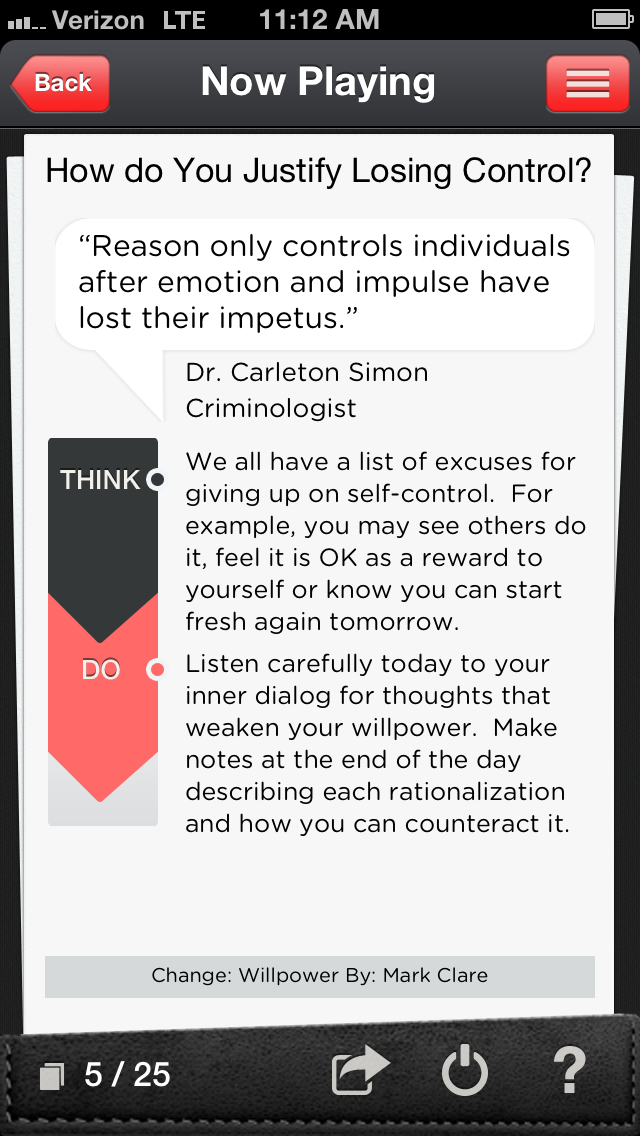 Willpower is the ability to carry out plans and reach goals especially when obstacles challenge us. It is what we use to resist temptation and keep going when we want to stop. Motivation, self-control, determination and grit all rolled up into our force of will.
Willpower is the ability to carry out plans and reach goals especially when obstacles challenge us. It is what we use to resist temptation and keep going when we want to stop. Motivation, self-control, determination and grit all rolled up into our force of will.
The topic of willpower is getting a lot of attention these days. A few examples:
- Akst, D. (2011). We Have Met the Enemy: Self-Control in an Age of Excess
- Baumeister, R. and Tierney, J. (2011). Willpower: Rediscovering the Greatest Human Strength
- McGongal, K. (2011). The Willpower Instinct: How Self-Control Works, Why It Matters, and What You Can Do To Get More of It
Some researchers argue that willpower is like a muscle. If we push too hard we become fatigued and can fail. On the other hand, if we train we can become very strong and develop endurance. But what techniques should we use to train?
To guide my training efforts I have reviewed the research and compiled 25 techniques that are practical enough to use in an everyday setting. To keep things simple I’ve documented each technique on a knowledge card that takes only a few minutes to use. Check out the example card to the right.
You can access the techniques in NewHabits a free iPhone and iPad app. Look in the store for the willpower deck. In the morning I quickly scan the deck and pick a card I want to play. With each play I strengthen my willpower muscle. It is easy to share the cards with friends through email, Facebook or Twitter.
Give the App and try and share your cards with others. I would like to hear from readers about how well the cards work and what other cards should be added.
Categories: Books, Cognitive Development, Mental Focus, Software, Training Tags:
Boost Your Brain and Help Veterans
UPDATE: The contest ends on April 29th and they already passed the 30,000 start mark!
A reader sent me a note about a brain-a-thon Posit Science is running. You do brain training exercises and earn stars (points)  towards free subscriptions to BrainHQ for veterans with brain related inquiries. But you won’t be working alone. All your stars are added to those earned by others and if the total hits 10,000 Posit with donate 200 one-year subscriptions and if we hit 40,000 stars they will donate 500 subscriptions worth almost $50,000.
towards free subscriptions to BrainHQ for veterans with brain related inquiries. But you won’t be working alone. All your stars are added to those earned by others and if the total hits 10,000 Posit with donate 200 one-year subscriptions and if we hit 40,000 stars they will donate 500 subscriptions worth almost $50,000.
This is also a good way for you to try out some of the services for free. The brain training should help you focus attention, sharpen recall and process information faster. You get a brain boost and an opportunity to help veterans and their families. A good deal!
Categories: Memory and Learning, Mental Focus, Software Tags:
Facebook Improves Mental Updating by 25%
An interesting preliminary study from the psychology department at the University of Arizona found that seniors trained to use Facebook showed measurable improvement in their cognitive abilities. More specifically:
“In the follow-ups, those who had learned to use Facebook performed about 25 percent better than they did at the start of the study on tasks designed to measure their mental updating abilities”
Mental updating is the ability to add and delete contents in your working memory. The study included a small group of seniors ages 68-91 with little or no prior Facebook experience. Participants friended only those in their group and made at least one short post daily.
Researchers believe that the constant information updating on Facebook and its relatively complex interface are responsible for the improvement. But more research is needed.
I am interested to hear from readers that use Facebook as a means to boost cognitive performance or maintain brain health.
Categories: Memory and Learning, Mental Focus, Older Adult, Software, Training Tags:
Is Turmeric a Super Brain Spice?
 Psychology today has an interesting post on the brain boosting effects of Curry. They claim over 4000 studies of Curry’s health benefits have been conducted over the last 10 years. General findings for brain function and cognitive performance are that Curry containing tumeric can:
Psychology today has an interesting post on the brain boosting effects of Curry. They claim over 4000 studies of Curry’s health benefits have been conducted over the last 10 years. General findings for brain function and cognitive performance are that Curry containing tumeric can:
decrease the risk of dementia, stimulate the grow of new brain cells, increase the production of neurotransmitters that support clear thinking and good moods and is being a strong antioxidant it will reduce inflammation that can harm brain cells.
The key ingredient in Curry that is doing the brain work is the turmeric, a spice you can buy in local your grocery store. The article goes on to suggest other spices to use it with and a recipe to try. For example, using turmeric with black pepper enhances absorption of the spice into your system by 2000%.
I am going to experiment with turmeric and try and find ways to include it in my daily diet. Besides curry-based meals there are for example turmeric teas, eggs, fries and salads to try and even special turmeric or curcumin supplements.
Categories: Cognitive Development, Diet, Mental Focus Tags:
Use Clothes to Improve Cognitive Performance
 There are small things we can do with our bodies to improve brain function and cognitive performance in real-time. I have documented many of these techniques on the Cognitive Design blog and you can find them under the tag embodied cognition. Some examples:
There are small things we can do with our bodies to improve brain function and cognitive performance in real-time. I have documented many of these techniques on the Cognitive Design blog and you can find them under the tag embodied cognition. Some examples:
- Holding objects can improve certain types of reasoning and recall
- Walking can improve thinking
- Clenching muscles amplifies will power
- Stepping back from a difficult situation can trigger higher cognitive functions
- Feeling warm or cold primes our emotional judgments about other people
- Swaying back and fourth can improve reflection
- Making hand gestures can improve learning and recall
- Short duration physical breaks (e.g. playing catch) between sessions improves conceptual learning
- Body posture impacts how confident we are about our beliefs and thinking abilities.
So our minds work in part by the way we use our bodies. Now new research indicates that cognitive performance can also be tuned by the clothing we put on our bodies or so-called enclothed cognition. For example:
“If you wear a white coat that you believe belongs to a doctor, your ability to pay attention increases sharply. But if you wear the same white coat believing it belongs to a painter, you will show no such improvement.”
Our cognitive performance improves when we believe we are wearing smart clothes!
I am interested to hear from readers that use clothes that they believe make them smarted. Could be tie, top or outfit you wear to perform well on a test or during an interview. Please describe it and explain why it works.
Categories: Manage Emotions, Memory and Learning, Mental Focus Tags:

